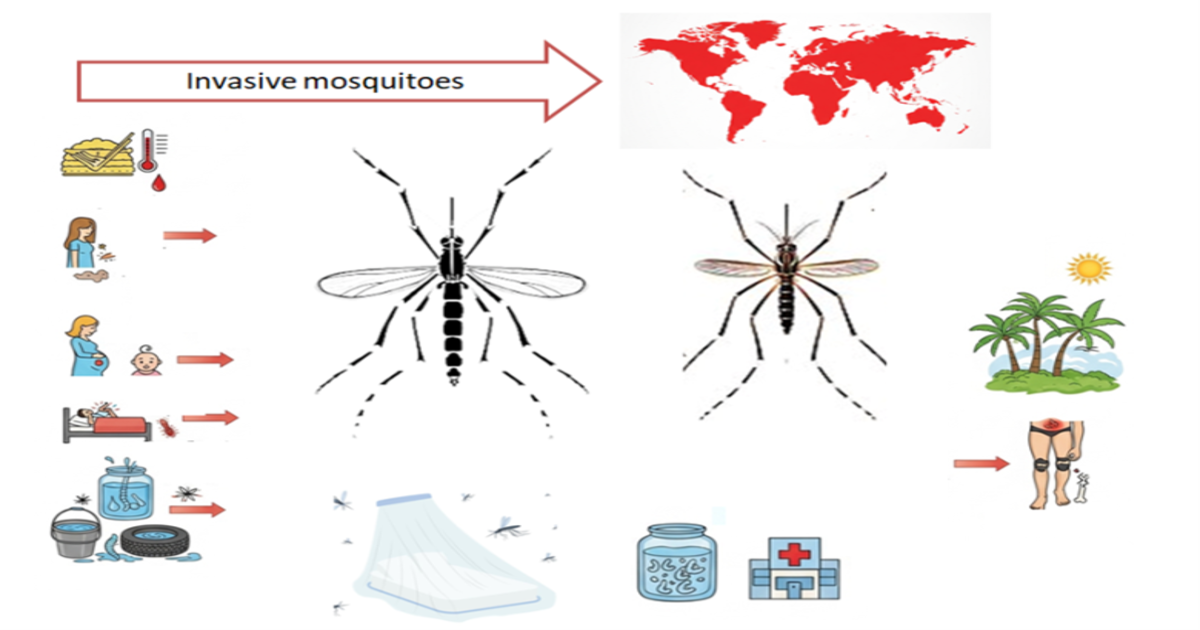Global Perspectives on the Role of Invasive Mosquito Species and Emerging Vector-Borne Diseases
A special issue of Tropical Medicine and Infectious Disease (ISSN 2414-6366). This special issue belongs to the section "Vector-Borne Diseases".
Deadline for manuscript submissions: 1 July 2026 | Viewed by 243

Special Issue Editors
Interests: vectors; vector-borne diseases; mosquitoes; invasive species
Interests: vector control; mosquitoes; arboviruses; medical entomology
Interests: animal viral diseases; molecular diagnostics; epidemiology
Special Issues, Collections and Topics in MDPI journals
Special Issue Information
Dear Colleagues,
The massive global burden caused by mosquito-borne diseases represents an increasing threat to public and animal health. Rising local transmissions mainly occur due to the successful distribution of invasive mosquito species into regions previously unaffected—facilitated by global travel and trade and global warming. Invasive mosquito species (IMS) exert a significant and growing impact on ecosystems, public health, and economics. They demonstrate highly aggressive behavior, causing nuisance and representing the efficient vectors of pathogens responsible for serious diseases. Once introduced, IMS outcompete native mosquitoes, leading to a cascade through ecosystems, affecting predators relying on indigenous mosquitoes. A threat to biodiversity may lead to the homogenization of biotic communities through the proliferation of cosmopolitan species. Habitat loss leads to an increased risk of species extinction.
Regardless of significant progress in the control strategies, emerging challenges driven by globalization and climate change emphasize the need for further research and adaptable strategies. Strengthening surveillance and investigating the factors influencing vector abundance and distribution are strongly recommended, as these efforts are essential for predicting disease outbreaks and the development of effective measures. The main goal of this Special Issue is to address the above-given concerns through comprehensive studies related to IMS and mosquito-borne diseases. To further explore the scope and boundaries of this Special Issue, we invite you to contribute manuscripts on the following topics:
- Biology and ecology of IMS;
- Monitoring and surveillance of IMS;
- Effects of climate change on IMS;
- Emerging mosquito-borne diseases;
- Influence of microbiota and symbionts on transmission dynamics;
- Epidemiological modeling of mosquito-borne diseases;
- Socioeconomic impacts of IMS and related diseases;
- Diagnostics for pathogen detection in vectors/hosts;
- Modelling geographic expansion under future climate scenarios;
- Novel mosquito control methods;
- Integrated vector management approaches for IMS;
- Insecticide resistance;
- Community-based and policy-driven control programs;
- Citizen science;
- Human behavior and exposure risk in areas with IMS;
- Public awareness and education campaigns;
- One Health perspectives.
Dr. Mihaela Kavran
Dr. Rubén Bueno-Marí
Dr. Vesna Milicevic
Guest Editors
Manuscript Submission Information
Manuscripts should be submitted online at www.mdpi.com by registering and logging in to this website. Once you are registered, click here to go to the submission form. Manuscripts can be submitted until the deadline. All submissions that pass pre-check are peer-reviewed. Accepted papers will be published continuously in the journal (as soon as accepted) and will be listed together on the special issue website. Research articles, review articles as well as short communications are invited. For planned papers, a title and short abstract (about 100 words) can be sent to the Editorial Office for announcement on this website.
Submitted manuscripts should not have been published previously, nor be under consideration for publication elsewhere (except conference proceedings papers). All manuscripts are thoroughly refereed through a single-blind peer-review process. A guide for authors and other relevant information for submission of manuscripts is available on the Instructions for Authors page. Tropical Medicine and Infectious Disease is an international peer-reviewed open access monthly journal published by MDPI.
Please visit the Instructions for Authors page before submitting a manuscript. The Article Processing Charge (APC) for publication in this open access journal is 2700 CHF (Swiss Francs). Submitted papers should be well formatted and use good English. Authors may use MDPI's English editing service prior to publication or during author revisions.
Keywords
- vectors
- vector-borne diseases
- mosquitoes
- invasive species
- aedes albopictus
- monitoring
- mosquito control
- One Health approach
- surveillance
- vector management
Benefits of Publishing in a Special Issue
- Ease of navigation: Grouping papers by topic helps scholars navigate broad scope journals more efficiently.
- Greater discoverability: Special Issues support the reach and impact of scientific research. Articles in Special Issues are more discoverable and cited more frequently.
- Expansion of research network: Special Issues facilitate connections among authors, fostering scientific collaborations.
- External promotion: Articles in Special Issues are often promoted through the journal's social media, increasing their visibility.
- Reprint: MDPI Books provides the opportunity to republish successful Special Issues in book format, both online and in print.
Further information on MDPI's Special Issue policies can be found here.








